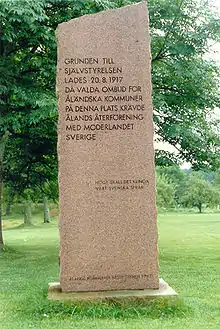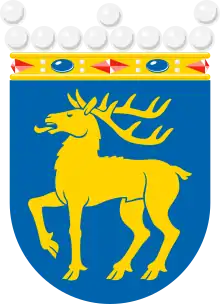Åland dialects
Åland (Swedish: åländska) are dialects of Swedish spoken in the Åland Islands, an autonomous province of Finland. The Åland dialects have similarities to both Finland Swedish and the historical dialects of Uppland, but are generally considered to be part of Eastern Swedish (östsvenska mål, varieties of Swedish spoken in Finland and Estonia).

Swedish is the sole official language of Åland,[1] and its status is protected in the självstyrelselag, a law that guarantees the islands' autonomy within Finland.
Phonology
As in Finland Swedish, the tonal word accent that distinguishes certain minimal pairs is not present in Åland. Thus Central Swedish [ˈǎnːdɛn] ('the duck') and [ˈânːdɛn] ('the spirit') are both pronounced [ˈanːdɛn].[2]
Characteristics
Certain expressions are typical of Åland dialects. For example, the double genitive in Vemses flicka/pojke är du då? ("Whose's girl/boy are you?" (Vems flicka/pojke är du då in Standard Swedish)) carries the implication that the asker might know the parents of the person asked, likely in a small society such as Åland. Another characteristic is the substitution of inte (not) with inga (no, nobody, none; in Standard Swedish a plural form): Jag har inga varit där ("I have not been there").
A feature that Åland shares with Finland Swedish is the reduction of the words inte (not), skulle (should) and måste (must) to int, sku and måst respectively.[2]
Vocabulary
The dialectal vocabulary of Åland Swedish is composed of words that are either characteristic of Eastern Swedish or have passed out of use (but are still understood) in the Swedish spoken in Sweden. Traces of Finnish, Russian and English can also be found in the dialect because of historical contact.[2]
Below is a selection of dialectal words and expressions used in Åland Swedish:[2]
| Åland Swedish | Standard Swedish | Translation | Notes |
|---|---|---|---|
| batting n. | (trä)regel | batten | batting in standard Swedish means baby. Probably from English batten. |
| batteri n. | (värme)element | radiator | batteri in standard Swedish means battery. |
| butka n. | fängelse | jail | From Russian будка (cf. Finnish putka) |
| byka v. | tvätta (kläder) | wash clothes | From byk, laundry. Byk is archaic in Sweden (cf. Finnish pyykki). |
| bykmaskin n. | tvättmaskin | washing machine | See above |
| egnahemshus n. | villa | (detached) house | Archaic in Sweden. |
| jo interj. | ja | yeah | Variant form in Sweden, an affirmative answer to a negative question or statement, cf. French si |
| julgubbe n. | jultomte | Santa Claus | |
| jåla v. | tramsa, prata strunt | fool around, talk rubbish | |
| nojsa v. | bråka, tjata, föra oväsen | kick up a fuss, nag, make a noise | Archaic in Sweden. From English noise |
| Nåssådå! exp. | — | — | Consoling expression used when something does not go as expected |
| si v. | se | see | Åland Swedish pronunciation of se (see Swedish phonology) |
| Siddu barra! exp. | lit. Ser du bara, i.e. Ser man på | Just watch | |
| småkusin n. | syssling | second cousin | Possibly a semantic loan from Finnish pikkuserkku, 'small cousin' |
| stöpsel n. | stickpropp | electric plug | From Russian штепсель (shtepsel), ultimately from German Stöpsel ('cork') |
| tövla v. | vara klumpig, fumlig | be clumsy, fumbling | |
| vilig adj. | riktigt bra | very good, awesome | |
| ämbar n. | hink | bucket | Archaic in Sweden. Word borrowed from Low German, derived from Latin amphora. |
See also
References
- Självstyrelselag för Åland 16.8.1991/1144 - 36 §. Retrieved 10 Apr. 2009.
- Åländska ord och uttryck. Bibliotek.ax. Retrieved 10 Apr. 2009.
Bibliography
- Andersson, Sven. Notlage, notlösare och notgår: ordens betydelse i åländska folkmål. Part of Skrifter utgivna av Historiska samfundet i Åbo. 1954. pp. 18–30.
- Ramsdahl, Carl. Ryska lånord i åländskan. 1976.
- Sundberg, Eva. Dialekten i Ålands nordöstra skärgård. Mariehamn 1993.
- Svenblad, Ralf. Med åländska ord. Mariehamn 1996.
- Willandt, August. Åländskt bygdemål. 1919.
External links
- Ryska lånord i åländskan (Russian loanwords in Åland Swedish)
- Listen to spoken Åland Swedish
